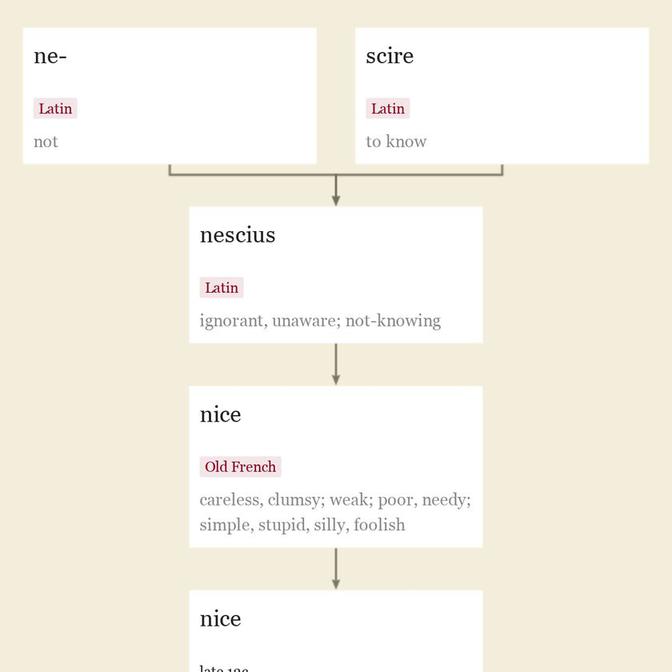overnice (adj.)
同时也有 over-nice,意为“过于讲究的”,早在14世纪初就出现了,由 over- 和 nice(形容词)组成。
overnice 的相关词汇

“愚蠢的,无知的,轻率的,毫无意义的”都是13世纪晚期的意思,源于12世纪的古法语“nice”(意思是“粗心,笨拙; 虚弱; 贫穷,贫困; 简单,愚蠢,傻,糊涂”),它来自拉丁语的“nescius”(意思是“无知的,不知道的”,字面意思是“未知”),由“ne-”(来自 PIE 根“*ne-”)+“scire”的词干构成,后者的词源请参考“science”。正如[Weekley]所说:“对于一个形容词来说,它的词义发展是不同寻常的。”——意思是从“胆小,胆怯”的(1300年前); 到“爱挑剔的,挑剔的”(14世纪后期); 到“讲究,精致”的(大约1400年); 到“精确,仔细”的(16世纪末,保留在“a nice distinction”和“nice and early”等术语中); 到“令人愉快,可爱的”(1769年); 到“友好,体贴的”(1830年)。
In many examples from the 16th and 17th centuries it is difficult to say in what particular sense the writer intended it to be taken. [OED]
许多16世纪和17世纪的例子中,很难说作者的特别用意是什么。 [OED]
到了1926年,有人说:“它对女士们太过受欢迎,女士已经把它中的所有个性都吸引走了,并将其变成了一种模棱两可和温和的令人愉快的气氛。” [Fowler]
"I am sure," cried Catherine, "I did not mean to say anything wrong; but it is a nice book, and why should I not call it so?" "Very true," said Henry, "and this is a very nice day, and we are taking a very nice walk; and you are two very nice young ladies. Oh! It is a very nice word indeed! It does for everything." [Jane Austen, "Northanger Abbey," 1803]
“我保证,”凯瑟琳嚷道,“我不是有意说错任何话; 但它 is 一本好书,我为什么不能这么说呢?”“非常正确,”亨利说,“今天是非常好的一天,我们正在散步,这是非常好的散步; 你们两个是非常好的年轻女士。哦!这真是个非常好的词!什么都可以这样说。” [简奥斯汀,《诺桑觉寺》(Northanger Abbey),1803年]
有关意义的发展,请参考 fond, innocent, lewd,还有 silly, simple。
这个词缀的意思各不相同,可以表示“在上面; 最高的; 横跨; 更高的权力或权威; 过多的; 超出正常的; 外部的; 超越时间,太久了”,源自古英语 ofer(来自 PIE 词根 *uper “在上面”)。Over 及其日耳曼语系的相关词缀被广泛用作前缀,有时也可以带有否定的力量。这在现代英语中很少见,但可以比较哥特语 ufarmunnon “忘记”, ufar-swaran “假誓; 发假誓”; 古英语 ofercræft “欺诈”。
In some of its uses, moreover, over is a movable element, which can be prefixed at will to almost any verb or adjective of suitable sense, as freely as an adjective can be placed before a substantive or an adverb before an adjective. [OED]
此外,在某些用法中, over 是一个可移动的元素,可以随意添加到几乎任何具有适当意义的动词或形容词之前,就像形容词可以放在名词之前,副词可以放在形容词之前一样自由。[OED]
在现在不存在的古老词汇中,有古英语 oferlufu(中古英语 oferlufe),字面意思是“过度的爱”,因此表示“过度或过分的爱”。中古英语中的 over- 也可以带有“太少,低于正常”的意义,例如 over-lyght “太轻”(约 1400 年), overlitel “太小”(14 世纪中期), oversmall(13 世纪中期), overshort 等。